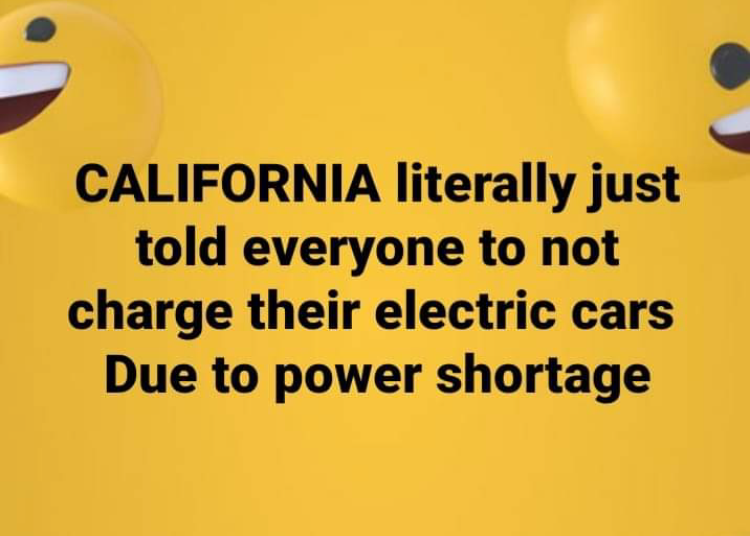As much of the western U.S. faced extreme heat danger and unprecedented drought conditions in June 2021, California officials advised residents to take certain measures in an effort to conserve energy across the power grid.
One such measure urged Californians to charge their electric vehicles in advance of peak power demand hours. A misconstrued version of this advice circulated on social media, suggesting that there wasn’t enough power available to charge electric cars:

The above-displayed meme was inaccurate. California did not tell “everyone” not to charge their electric cars. In reality, residents were asked to charge their cars at a time other than when the energy supply was limited.
The California Independent System Operator (ISO), a nonprofit organization that oversees the state’s power and electric systems, issued a “flex alert” advising Californians to conserve energy during a specific time frame on June 17 and the following day to “help balance supply and demand” on the power grid due to extreme heat across the region. Unplugging electric vehicles was just one recommendation in a list of power-saving strategies included in the alert.
Flex alerts ask consumers to conserve electricity during the evening, typically between 6 and 9 p.m. local time, when power consumption tends to be this highest. This is to relieve stress on electrical grids during extreme heat. Flex alerts are voluntary calls that are typically issued in the summer when hot weather increases energy demand near its capacity.
“This usually happens in the evening hours when solar generation is going offline and consumers are returning home and switching on air conditioners, lights, and appliances,” wrote the ISO.
What triggers a #FlexAlert? Typically issued in the summer when extremely hot weather drives up electricity use, making power supply scarce, usually in the evenings when #renewableenergy resources are ramping down. Learn more at https://t.co/SvLoptiUH6.
— Flex Alert (@flexalert) June 18, 2021
On June 17 and 18, ISO also asked consumers to set thermostats to 78 degrees or higher (health permitting), avoid using major appliances, and turn off unnecessary lights. The ISO also recommended people charge electronic devices and vehicles earlier to avoid further strain on the power grid.
— California ISO (@California_ISO) June 19, 2021
As of this writing, there was no longer a flex alert in place.
CA, you did it again! Your conservation efforts helped keep the #powergrid stable. We appreciate you.
— California ISO (@California_ISO) June 19, 2021
0 Comments